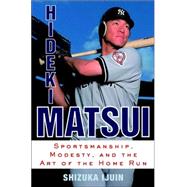
| A Child of Baseball | p. 3 |
| The Star, Modesty Included | p. 12 |
| A Promise to His Father | p. 22 |
| Japan's Number One Slugger | p. 34 |
| A Sigh of Relief | p. 39 |
| "More Like What a Person Ought to Be" | p. 43 |
| A Wrenching Decision | p. 53 |
| "Postwar Japan Sends Its Finest Citizens to America" | p. 69 |
| War, Peace, and Ground Zero | p. 75 |
| The Mentors Behind Matsui | p. 82 |
| To the Sponsor They Have Never Met | p. 90 |
| Raining Cats and Dogs | p. 97 |
| The Spirit of the Yankees | p. 108 |
| From Battlefield to Baseball Field | p. 115 |
| "Yankees Fans Are Such Wonderful People!" | p. 119 |
| Matsui in the Spring | p. 127 |
| Endnotes | p. 131 |
| Acknowledgments | p. 133 |
| Table of Contents provided by Ingram. All Rights Reserved. |
The New copy of this book will include any supplemental materials advertised. Please check the title of the book to determine if it should include any access cards, study guides, lab manuals, CDs, etc.
The Used, Rental and eBook copies of this book are not guaranteed to include any supplemental materials. Typically, only the book itself is included. This is true even if the title states it includes any access cards, study guides, lab manuals, CDs, etc.
Excerpted from Hideki Matsui: Sportsmanship, Modesty, and the Art of the Home Run by Shizuka Ijuin
All rights reserved by the original copyright owners. Excerpts are provided for display purposes only and may not be reproduced, reprinted or distributed without the written permission of the publisher.